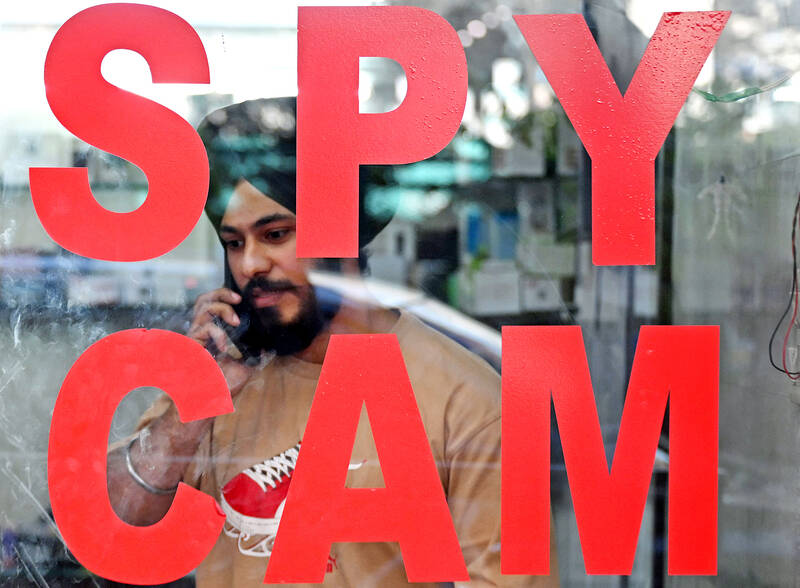From an anonymous office in a New Delhi mall, matrimonial detective Bhavna Paliwal runs the rule over prospective husbands and wives — a booming industry in India, where younger generations are increasingly choosing love matches over arranged marriage.
The tradition of partners being carefully selected by the two families remains hugely popular, but in a country where social customs are changing rapidly, more and more couples are making their own matches.
So for some families, the first step when young lovers want to get married is not to call a priest or party planner but a sleuth like Paliwal with high-tech spy tools to investigate the prospective partner.

Photo: AFP
Sheela, an office worker in New Delhi, said that when her daughter announced she wanted to marry her boyfriend, she immediately hired Paliwal.
“I had a bad marriage,” said Sheela, whose name has been changed as her daughter remains unaware her fiance was spied on.“When my daughter said she’s in love, I wanted to support her — but not without proper checks.”
Paliwal, 48, who founded her Tejas Detective Agency more than two decades ago, says business is better than ever.

Photo: AFP
Her team handles around eight cases monthly.
In one recent case — a client checking her prospective husband — Paliwal discovered a decimal point salary discrepancy.
“The man said he earns around US$70,700 annually,” Paliwal said. “We found out he was actually making US$7,070.”
‘SERVICE TO SOCIETY’
It is discreet work. Paliwal’s office is tucked away in a city mall, with an innocuous sign board saying it houses an astrologer — a service families often use to predict an auspicious wedding date.
“Sometimes my clients also don’t want people to know they are meeting a detective,” she laughed.
Hiring a detective can cost from US$100 to US$2,000, depending on the extent of surveillance needed.
That is a small investment for families who splash out many times more on the wedding itself.
It is not just worried parents trying to vet their prospective sons or daughters-in-law.
Some want background checks on their future spouse — or, after marriage, to confirm a suspected affair.
“It is a service to society,” said Sanjay Singh, a 51-year-old sleuth, who says his agency has handled “hundreds” of pre-matrimonial investigations this year alone.
Private eye Akriti Khatri said around a quarter of cases at her Venus Detective Agency were pre-marriage checks.
“There are people who want to know if the groom is actually gay,” she said, citing one example.
Arranged marriages binding two entire families together require a chain of checks before the couple even talk.
That includes financial probes and, crucially, their status in India’s millennia-old caste hierarchy.
Marriages breaking rigid caste or religious divisions can have deadly repercussions, sometimes resulting in so-called “honor” killings.
In the past, such premarital checks were often done by family members, priests or professional matchmakers.
But breakneck urbanization in sprawling megacities has shaken social networks, challenging conventional ways of verifying marriage proposals.
Arranged marriages now also happen online through matchmaking Web sites, or even dating apps.
“Marriage proposals come on Tinder too,” Singh added.
‘BASIS OF LIES’
The job is not without its challenges.
Layers of security in guarded modern apartment blocks mean it is often far harder for an agent to gain access to a property than older standalone homes.
Singh said detectives had to rely on their charm to tell a “cock and bull story” to enter, saying his teams tread the grey zone between “legal and illegal.”
But he stressed his agents operate on the right side of the law, ordering his teams to do “nothing unethical” while noting investigations often mean “somebody’s life is getting ruined.”
Technology is on the side of the sleuths.
Khatri has used tech developers to create an app for her agents to upload records directly online — leaving nothing on agents’ phones, in case they are caught.
“This is safer for our team,” she said, adding it also helped them “get sharp results in less time and cost.”
Surveillance tools starting at only a few dollars are readily available.
Those include audio and video recording devices hidden in everyday items such as mosquito repellent socket devices, to more sophisticated magnetic GPS car trackers or tiny wearable cameras.
The technology boom, Paliwal said, has put relationships under pressure.
“The more hi-tech we become, the more problems we have in our lives,” she said.
But she insisted that neither the technology nor the detectives should take the blame for exposing a cheat.
“Such relationships would not have lasted anyway,” she said. “No relationship can work on the basis of lies.”

As Taiwan’s second most populous city, Taichung looms large in the electoral map. Taiwanese political commentators describe it — along with neighboring Changhua County — as Taiwan’s “swing states” (搖擺州), which is a curious direct borrowing from American election terminology. In the early post-Martial Law era, Taichung was referred to as a “desert of democracy” because while the Democratic Progressive Party (DPP) was winning elections in the north and south, Taichung remained staunchly loyal to the Chinese Nationalist Party (KMT). That changed over time, but in both Changhua and Taichung, the DPP still suffers from a “one-term curse,” with the

Jan. 26 to Feb. 1 Nearly 90 years after it was last recorded, the Basay language was taught in a classroom for the first time in September last year. Over the following three months, students learned its sounds along with the customs and folktales of the Ketagalan people, who once spoke it across northern Taiwan. Although each Ketagalan settlement had its own language, Basay functioned as a common trade language. By the late 19th century, it had largely fallen out of daily use as speakers shifted to Hoklo (commonly known as Taiwanese), surviving only in fragments remembered by the elderly. In

William Liu (劉家君) moved to Kaohsiung from Nantou to live with his boyfriend Reg Hong (洪嘉佑). “In Nantou, people do not support gay rights at all and never even talk about it. Living here made me optimistic and made me realize how much I can express myself,” Liu tells the Taipei Times. Hong and his friend Cony Hsieh (謝昀希) are both active in several LGBT groups and organizations in Kaohsiung. They were among the people behind the city’s 16th Pride event in November last year, which gathered over 35,000 people. Along with others, they clearly see Kaohsiung as the nexus of LGBT rights.

In the American west, “it is said, water flows upwards towards money,” wrote Marc Reisner in one of the most compelling books on public policy ever written, Cadillac Desert. As Americans failed to overcome the West’s water scarcity with hard work and private capital, the Federal government came to the rescue. As Reisner describes: “the American West quietly became the first and most durable example of the modern welfare state.” In Taiwan, the money toward which water flows upwards is the high tech industry, particularly the chip powerhouse Taiwan Semiconductor Manufacturing Co (TSMC, 台積電). Typically articles on TSMC’s water demand